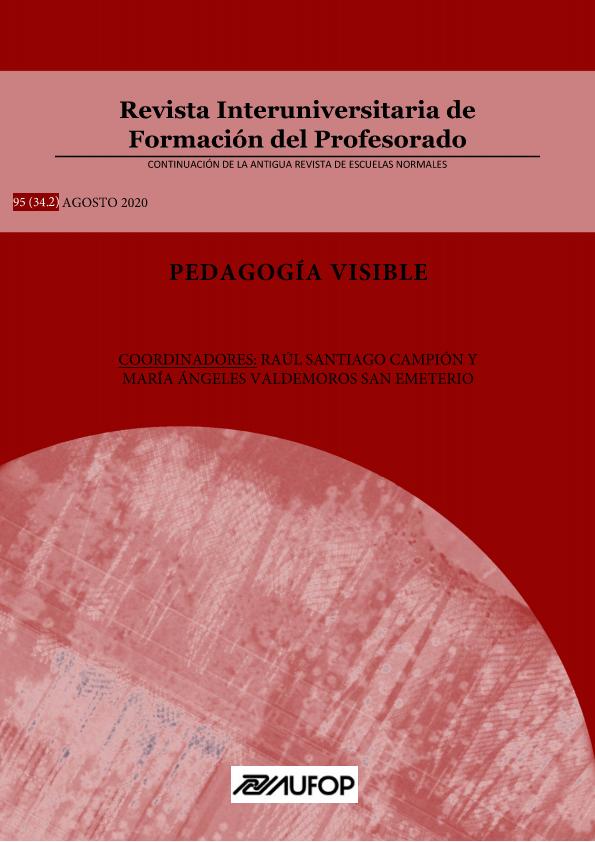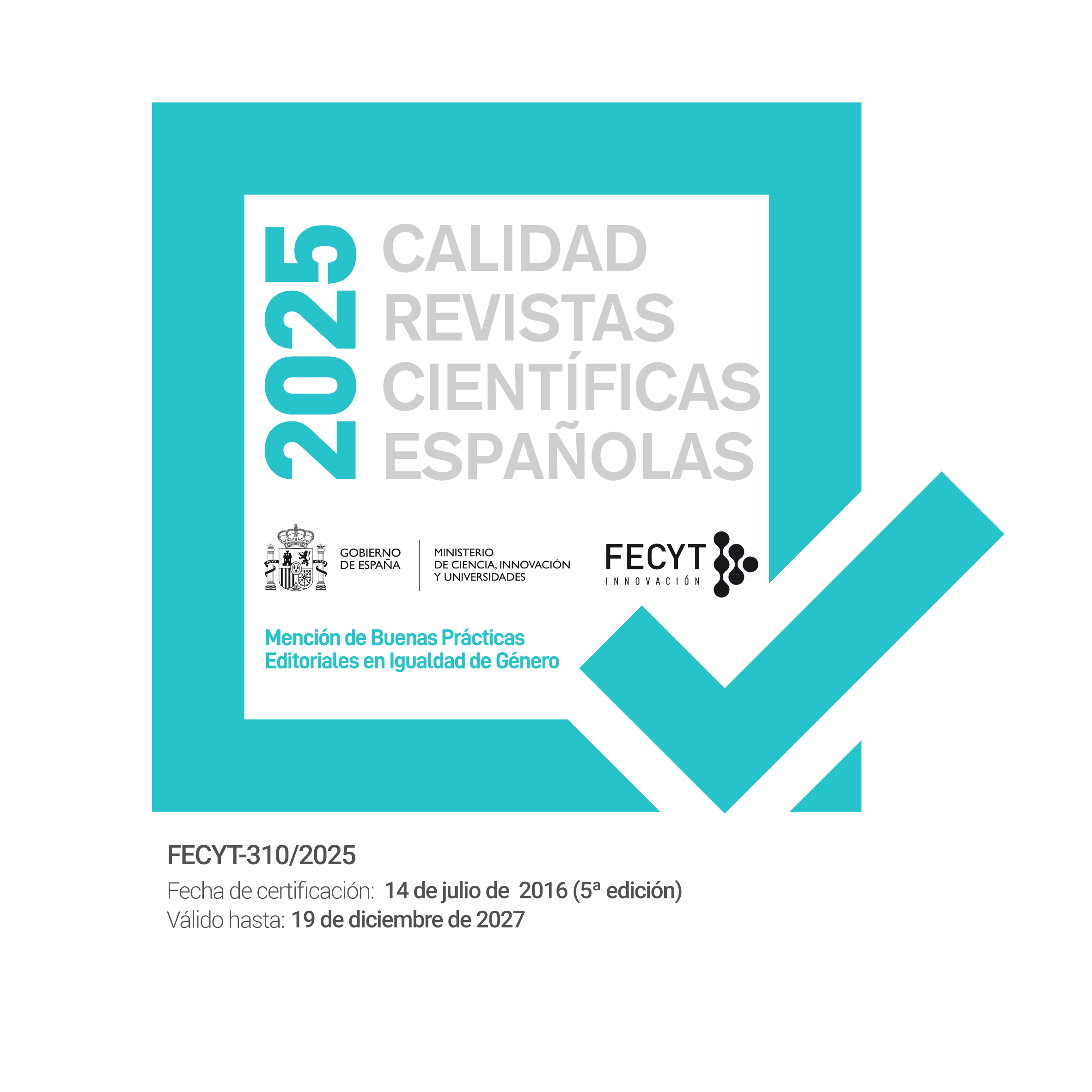Evaluación online orientada al aprendizaje universitario: Impacto del feedback en los resultados de los estudiantes
DOI:
https://doi.org/10.47553/rifop.v34i2.77697Resum
Investigaciones recientes interesadas en garantizar la calidad de la Educación Superior subrayan con fuerza la conveniencia de introducir cambios en el modo tradicional de orientar la evaluación durante la actividad didáctica. Convencidos de su importancia, el presente estudio tiene como objetivo principal analizar el impacto del feedback en un sistema de evaluación online diseñado desde un enfoque formativo para promover y mejorar el aprendizaje de estudiantes universitarios. La intervención se realizó durante dos cursos académicos consecutivos con 90 estudiantes de ingeniería pertenecientes a titulaciones de grado y máster de la Escuela Técnica Superior de Ingeniería Industrial de la Universidad de La Rioja. Los análisis efectuados indican el efecto positivo que tiene el sistema propuesto, tanto en el rendimiento de los estudiantes como en su grado de satisfacción con la evaluación y feedback proporcionados. Entre las conclusiones obtenidas, cabe destacar que el sistema de evaluación diseñado permite proporcionar información que ayuda a los estudiantes a identificar a tiempo sus puntos débiles en el proceso de aprendizaje y a mejorar su propia cualificación.
Referències
Ajjawi, R. y Boud, D. (2018). Examining the nature and effects of feedback dialogue. In Assessment & Evaluation in Higher Education, 43:7, 1106-1119, DOI: 10.1080/02602938.2018.1434128
Baeten, M., Dochy, F., Struyven, K., Parmentier, E. & Vanderbruggen, A. (2016). Student-centred learning environments: an investigation into student teacher´s instructional preferences and approaches to learning. Learning Environments Research,19(1), 43-62. DOI: 10.1007/s10984-015-9190-5
Bennett, R. E. (2011). Formative assessment: a critical review. In Assessment in Education: Principles, Policy & Practice, 18, 5-25. DOI: 10.1080/0969594X.2010.513678
Biggs, J.B. y Tang, C. (2011). Teaching for Quality Learning at University (4th ed.). Berkshire: Open University Press.
Black, P. y Wiliam, D (1998). Inside the Black Box: Raising Standards through Classroom Assessment. London: King’s College London School of Education.
Boud, D. y Molloy, E. (2013). Rethinking models of feedback for learning: the challenge of design. In Assessment & Evaluation in Higher Education, 38(6), 698-712. DOI: 10.1080/02602938.2012.691462
Carless, D. (2015). Exploring learning-oriented assessment processes. In Higher Education, 69, 963–976. DOI: 10.1007/s10734-014-9816-z
Carless, D. y Boud, D. (2018). The development of student feedback literacy: enabling uptake of feedback. In Assessment & Evaluation in Higher Education, 43(8), 1315-1325. DOI: 10.1080/02602938.2018.1463354
Dawson, Ph., Henderson, M., Mahoney, P., Phillips, M., Ryan, T., Boud, D. y Molloy, E. (2019). What makes for effective feedback: staff and student perspectives. In Assessment & Evaluation in Higher Education, 44(1), 25-36. DOI: 10.1080/02602938.2018.1467877
Delva, D., Sargeant, J., Miller, S., Holland, J., Brown, P., Leblanc, C., Lightfoot, K. y Mann, K. (2013). Encouraging residents to seek feedback. In Medical Teacher, 35(12), pp. e1625-e1631. DOI: 10.3109/0142159X.2013.806791
Díez, M.C., Pacheco, D.I., García, J.N., Martínez, B., Robledo, P., Álvarez, M. L., Carbonero, M. A., Román, J.M., Del Caño, M. y Monjas, I. (2009). Percepción de los estudiantes universitarios de educación respecto al uso de metodologías docentes y el desarrollo de competencias ante la adaptación al EEES: datos de la Universidad de Valladolid. En Aula Abierta, 37(1), 45-56.
Donia, M. B., O’Neill, T. A., y Brutus, S. (2018). The longitudinal effects of peer feedback in the development and transfer of student teamwork skills. In Learning and Individual Differences, 61, 87–98. DOI: 10.1016/j.lindif.2017.11.012.
Gibbs, G., y Simpson, C. (2004). Conditions under which assessment supports students’ learning. In Learning and Teaching in Higher Education, 1(1), 3–31. Recuperado de http://eprints.glos.ac.uk/id/eprint/3609
González-Marcos, A., Alba-Elías, F., Navaridas-Nalda, F., y Ordieres-Meré, J. (2016). Student evaluation of a virtual experience for project management learning: An empirical study for learning improvement. Computers & Education, 102, 172–187. DOI: 10.1016/j.compedu.2016.08.005
González-Marcos, A., Alba-Elías, F., y Ordieres-Meré, J. (2016). An analytical method for measuring competence in project management. British Journal of Educational Technology, 47(6), 1324–1339. DOI: 10.1111/bjet.12364
Hattie, J. (2008). Visible learning: a synthesis of over 800 meta‐analyses related to achievement. New York: Routledge. DOI: 10.4324/9780203887332
Hattie, J. y Timperley, H. (2007). The power of feedback. In Review of Educational Research, 77(1), 81–112. DOI: 10.3102/003465430298487
Henderson, M., Ajjawi, R., Boud, D. y Molloy, E. (Eds.). (2019). The Impact of Feedback in Higher Education: Improving Assessment Outcomes for Learners. Cham Switzerland: Palgrave Macmillan. Recuperado de https://doi.org/10.1007/978-3-030-25112-3
Henderson, M., Ryan, T. y Phillips, M. (2019.) The challenges of feedback in higher education, Assessment & Evaluatio. In Higher Education, 44(8), 1237-1252. DOI: 10.1080/02602938.2019.1599815
IPMA (2006). ICB: IPMA Competence Baseline. Version 3.0. Nijkerk, The Netherlands: International Project Management Association.
Morales, P. (2010). La evaluación formativa. En Morales, P. Ser profesor: una mirada al alumno, 2ª edición (capítulo II, pp. 33-90). Guatemala: Universidad Rafael Landívar, Recuperado de http://www.upcomillas.es/personal/peter/otrosdocumentos/Evaluacionformativa.pdf
Nicol, D. J. y Macfarlane-Drick, D. (2007). Formative assessment and self‐regulated learning: a model and seven principles of good feedback practice. Studies in Higher Education, 31, 199-218. DOI: 10.1080/03075070600572090
Office of Government Commerce (2009). Managing Successful Projects with PRINCE2TM. Norwich, UK: The Stationary Office.
Orgill, M. (2007). Situated cognition. In Bodner, G. M. y Orgill, M. (Eds.). Theoretical frameworks for research in chemistry/science education (pp. 187–203). Upper Saddle River, NJ: Prentice Hall.
Panadero, E., Broadbent, J., Boud, D. y Lodge, J. M. (2019). Using formative assessment to influence self- and co-regulated learning: the role of evaluative judgement. In European Journal of Psychology of Education, 34(3), 535-557. DOI: 10.1007/s10212-018-0407-8
Pardo, A. (2018). A feedback model for data-rich learning experiences. In Assessment & Evaluation in Higher Education, 43(3), 428–438. DOI:
https://doi.org/10.1080/02602938.2017.1356905.
Pardo, A., Jovanović, J., Dawson, S., Gašević, D., y Mirriahi, N. (2019). Using learning analytics to scale the provision of personalised feedback. In British Journal of Educational Technology, 50(1), 128–138. DOI: 10.1111/bjet.12592.
Pérez, J. (2018). La calidad y la evaluación en la Educación Superior. En Carrasco, S. y Corral, I. (coords). Docencia universitaria e innovación. Evolución y retos a través de los CIDUI (pp. 137-152). Barcelona: Octaedro. Recuperado de https://www.cidui.org/wp-content/uploads/2018/07/ePDF-DocenciaUniversitariaEInnovacion.pdf
Pintrich, P.R. y Zusho, A. (2002). Student motivation and self‐regulated learning in the college classroom. In Higher Education: handbook of theory and research (Vol. XVII, pp. 731-810). New York: Agathon Press.
Ryan, T., Gašević D. y Henderson, M. (2019). Identifying the Impact of Feedback Over Time and at Scale: Opportunities for Learning Analytics. In Henderson M., Ajjawi R., Boud D., Molloy E. (Eds). The Impact of Feedback in Higher Education (pp. 207-223) Palgrave Macmillan, Cham. DOI: 10.1007/978-3-030-25112-3_12
Sadler, D. R. (1989). Formative assessment and the design of instructional systems. In Instructional Science, 18(2), pp. 119-144. DOI: 10.1007/BF00117714
Santín, D. y Sicilia, G. (2015). Evaluar para mejorar: hacia el seguimiento y la evaluación sistemática de las políticas educativas. En Santín, D., Balart, P., Cabrales, A., Calero, J., De la Fuente, A., Escardíbul, J. O., Felgueroso, F. y Siclia, G., Reflexiones sobre el Sistema Educativo Español (pp. 283-312). Madrid: Centro de Estudios Ramón Areces. Recuperado de https://www.fundacionareces.es/recursos/doc/portal/2018/03/19/reflexiones-sistema-educativopdf.pdf
Tai, J., Ajjawi, R., Boud, D., Dawson, Ph. y Panadero, E. (2018). Developing evaluative judgement: enabling students to make decisions about the quality of work. In Higher Education, 76, 467–481. DOI: 10.1007/s10734-017-0220-3
Winstone N. (2019). Facilitating Students’ Use of Feedback: Capturing and Tracking Impact Using Digital Tools. In Henderson M., Ajjawi R., Boud D., Molloy E. (Eds). The Impact of Feedback in Higher Education (pp. 207-223) Palgrave Macmillan, Cham. DOI: 10.1007/978-3-030-25112-3_132
Winstone, N. E., Nash, R. A., Rowntree, J. y Parker, M. (2017). ‘It'd be useful, but I wouldn't use it’: barriers to university students’ feedback seeking and recipience. In Studies in Higher Education, 42(11), pp. 2026-2041. DOI: 10.1080/03075079.2015.1130032
Zimmerman, B. J. (2001). Theories of self-regulated learning and academic achievement: An overview and analysis. In Zimmerman, B. J. y D. H. Schunk (Eds). Self-regulated Learning and Academic Achievement: Theoretical Perspectives (pp. 1-37). London: Lawrence Erlbaum.
Descàrregues
Publicades
Com citar
Número
Secció
Llicència
The "Revista Interuniversitaria de Formación del Profesorado (RIFOP)", with ISSN print 0213-8646 and ISSN electronic 2530-3791), adheres to the copyright notices proposed by Creative Commons
Authors’ rights
Papers published in the journal are subject to the following terms:
1. The Asociación Universitaria de Formación del Profesorado (AUFOP) is the editor of the RIFOP and holds the copyright of the papers published therein. The reuse of these is allowed under the license for use as indicated under point 2.
© Asociación Universitaria de Formación del Profesorado (AUFOP)
2. The papers are published in electronic version under the license CreativeCommons Reconocimiento-NoComercial-SinObraDerivada 3.0 España (texto legal). Papers can be copied, used, disseminated, transmitted and publicly exhibited provided that: i) the authorship and original publication source are cited (journal, editors and URL of the paper); ii) they are nit used for commercial gain; iii) the existence and specifications of the license for use are mentioned.
3. Auto-archiving conditions. Authors are allowed and encouraged to disseminate electronic pre-print versions (versions prior to peer review) and/or post-print (versions reviwed and accepted for publication) of their papers prior to their publication, since this favors prompt circulation and dissemination and supposes a possible increase in cites and scope within the academic community.
Privacy declaration
The names and email addresses incorporated into this journal will be used solely for the declared purposes of the journal and will not be available for any other purposes or to third parties.






